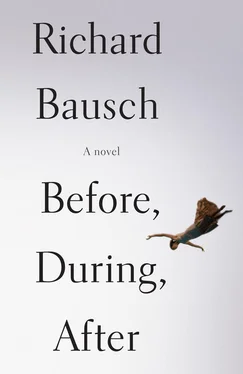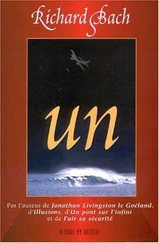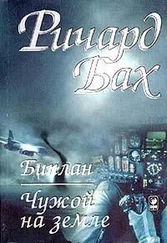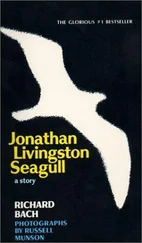6
She sat with Iris on the stone patio of a small coffee shop off Poplar Avenue. They were in the shade of the building, but it was hot, and Iris kept fanning herself with the menu card.
“There’s something else going on, isn’t there,” Iris said in a flat tone.
“Stress is going on,” Natasha told her. “Okay? I’ve been through hell. I thought my fiancé was dead or hurt, and I couldn’t get through.”
“But he wasn’t.” Iris’s face took on a ruminative look, as though she were dealing with some pain or cramp behind her eyes, a thought that hurt. It was an expression Natasha knew well. And just now she felt a sort of wondering disorientation, realizing the fact. “And, sweetie,” Iris went on, “this feels like more than having a scare about Michael.”
Natasha was silent. The server was a slight, dark brown young man wearing thick glasses. He brought the tea Iris had ordered.
Iris said, “Thanks, Philip.”
“You know him?”
“I’ve been coming here.”
Natasha smiled, shaking her head. “The things I don’t know about you.”
“Well.”
A moment later, Iris said, “Could it be that you’re having second thoughts?”
“Don’t be silly.”
“That’s not silly. It’s a legitimate question. It happens all the time. I had them before I married your grandfather.”
“I’m not having second thoughts.”
“Okay.”
They sipped the tea and watched the cars go by on the street.
“You really had second thoughts?”
Iris nodded. “They were the silly nervous thoughts of a girl. And given what happened I guess I should’ve had them. But remember, I was only twenty-four years old. And he was fifty-eight.”
“Everybody was married by then when you were a girl, right?”
“Yes, they were. Silly girls rushing into everything.”
“Do you have any regrets?”
“A little late for that, don’t you think?” Iris’s smile was tolerant, but it went away quickly. “Did something happen with Constance?”
“Constance got very drunk that first night after it happened.” Natasha saw a mental image of her friend, drink in hand, settling into the chilly water of the beach, and Mr. Skinner complaining about how cold it was. She found herself shaking a little, deep in the bone, and she sat forward slightly, both hands cradling the cup of warm tea.
“What just went through you.” For a second time, her grandmother’s question had the flat inflection of a statement.
“Nothing.”
“You just had a chill.”
“I did not — will you stop?”
“All right. So Constance got drunk that first night. Did she do something to you, or say something that upset you? Was it that she got drunk? I thought you said you got drunk, too.”
“No. Everyone — it seemed like everyone got drunk. I’m just saying—”
“Well, I need some sense of what’s still going through you.”
“ Nothing’s going through me. I’m putting my life together. I left a job I had for six years and I’ve moved home and this awful disaster has happened and the whole country’s reeling. What do you want me to do? I mean how do you want me to behave?”
“There’s no need to get upset.”
“Well, Michael said something this morning, too. I can’t seem to process all this the way I need to without everybody questioning me.”
“I wasn’t questioning you,” Iris said. “I want you to be all right. I was a little worried.”
“Can we go soon?”
“You haven’t touched your tea.”
They drank without looking at each other. Natasha was thinking about how little she actually knew of this woman who had raised her — a person of unvarying consistency in the way she went through her days. Everything precise and orderly as the notes in a Mozart concerto. Now and then she would have friends over from her work in the mayor’s office, women and men who knew her in her professional life and treated her with a deference. Sometimes, after Natasha was old enough to be on her own, Iris would go out with them to concerts or to one official occasion or another. Iris’s job was to organize such things, to be a kind of public relations maven for the city. But because there was always reluctance on the part of people from downtown or Midtown to go “all the way out” to Collierville, Iris and Natasha were alone together a lot. In the evenings they talked, grandmother and little girl, and then grandmother and young woman. Iris read to her from books, and they watched television; sometimes they went to movies. They were like girlfriends and, as Natasha had once started to say to Faulk, this was probably one reason she had been comfortable forming the friendship with Constance. Yet through all that time together in the house, they had never really talked about Iris herself, Iris’s life in the world before she was Natasha’s grandmother. Natasha knew that at the birthday party of a friend, she met a middle-aged man, William Mara, a colonel in the army, getting ready to retire. Pearl Harbor was a year away. They dated for two years while he was stationed in Anacostia, Virginia, and Iris went there and lived in a small apartment in D.C., near Catholic University.
There were romantic stories of him coming in the middle of the night to the street outside her apartment, standing down there whistling tunes from Glenn Miller and Benny Goodman for her. But on those occasions he was drunk, and the stories stopped there. She and William were married in 1942; he went away to the war in January 1943. She had Natasha’s mother, Laura, while he was in the Pacific.
He came home from the war and was changed, as a lot of men were. Iris would say only that she hadn’t remembered him as being that much older and that things were very different with him. His age had caught up with him, and also he had wounds in the bones of his legs that gave him trouble. He had caught malaria during the ordeal of island hopping in the tropics. And there really wasn’t anything for his kind of trouble in those days — men were expected to get on with their lives, and for a time William Mara did just that. But he had walked out when Natasha’s mother was five years old.
Natasha knew all this.
But of the life her grandmother led with him in those four and a half years, she knew almost nothing at all. It was something Iris simply never talked about because in fact she did not want to talk about Laura, did not want the memory of that loss in her thoughts. Natasha had come to the knowledge of this without actually having it expressed to her. Their talk was usually pleasant and affectionate, but it seldom became personal. This left Natasha feeling at times starved for something other than chatter.
Yet at that age, too, it was good not having so strongly inquisitive a guardian as others she knew.
Now she took a ten-dollar bill out of her purse and put it on the table.
“So,” her grandmother said. “About the wedding. You said you wanted it small. His father and stepmother, his aunt and uncle. Me. Your friend Constance?”
“I said I’d let her know the date. I guess I should.”
“Well, it’s your ceremony, isn’t it.”
“I will. I’ll call her. She probably won’t come.”
“Other friends?”
“Marsha Trunan. Who also might not come. But I really do want to keep it small. As small as possible.”
“Justice of the peace? That sort of thing?”
“It’ll be a civil ceremony, but performed by a priest.”
Iris shrugged. “Well, since Michael’s not preaching anymore, I didn’t think going secular was such an outlandish idea.”
“We sent the marriage notification into the church a while ago,” said Natasha. “Before I left for Jamaica.”
Читать дальше












